译林版英语七年级上册重点句型语法
- 格式:docx
- 大小:43.29 KB
- 文档页数:27
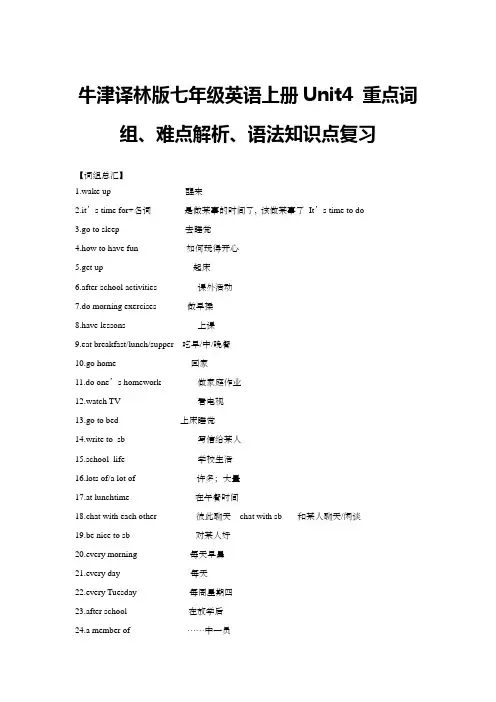
牛津译林版七年级英语上册Unit4 重点词组、难点解析、语法知识点复习【词组总汇】1.wake up 醒来2.it’s time for+名词是做某事的时间了, 该做某事了It’s time to do3.go to sleep 去睡觉4.how to have fun 如何玩得开心5.get up 起床6.after-school activities 课外活动7.do morning exercises 做早操8.have lessons 上课9.eat breakfast/lunch/supper 吃早/中/晚餐10.go home 回家11.do one’s homework 做家庭作业12.watch TV 看电视13.go to bed 上床睡觉14.write to sb 写信给某人15.school life 学校生活16.lots of/a lot of 许多;大量17.at lunchtime 在午餐时间18.chat with each other 彼此聊天chat with sb 和某人聊天/闲谈19.be nice to sb 对某人好20.every morning 每天早晨21.every day 每天22.every Tuesday 每周星期四23.after school 在放学后24.a member of ……中一员25.the Swimming Club 游泳兴趣小组26.have a good time 玩的开心27.email sb 给某人发电子邮件28.play games 玩游戏, 进行比赛29.twice a week 一周两次30.have fun 娱乐,乐趣;开心P.27-3031.listen to the radio 听收音机32.make a model plane 制作模型飞机33.read newspapers 看报read books 看书34.write emails 写邮件35.watch football matches 看球赛36.watch too much TV 看电视太多37.listen to music 听音乐38.listen to the teacher 听老师讲39.walk a dog 遛狗40.a piece of good news 一则好消息41.in the school football team 在学校足球队42.all the time 一直43.know (a lot) about…对……了解(很多)44.read comic books 看连环漫画书45.on the volleyball court 在排球场46.from...to…从……到……47.meet up with sb. 约见某人48.do their homework 做他们的作业49.under a big tree 在大树下50.go to one’s dancing lesson 去上舞蹈课51.have (no) time to do sth. 有(没有)时间做某事52.have a lot of new friends 有许多新朋友53.teach us English 教我们英语54.talk about…谈论关于……55.at home 在家56.say hello to…向……问好P.31-3757.the Class 1,Grade 7 students 七年级一班学生58.go on a trip 旅行, 旅游have one’s trip59.look at the posters 看海报60.more than 多于;超过61.twice a week 一星期两次62.the China Space Museum 中国航空博物馆63.the China Science and Technology Museum 中国科技博物馆64.next Monday 下周一65.each student 每个学生66.thank you for doing sth 为做某事而谢谢你anize the class trip 组织班级旅游68.I would like to+动词原形愿意干某事;想要干某事69.the price for………的价格70.be open/be closed 开着、关着71.look forward to…期盼;盼望72.enjoy…very much 非常喜爱……73.need to do sth 需要做……74.borrow a pen 借一支钢笔75.be busy doing 忙于做某事76.be good for 有益于77.help sb do sth 帮助某人做某事78.get ready for 准备……79.learn more about 更多了解……80.the answer to ………的答案81.the Computer Club 电脑兴趣小组【难点解析】1.Is it time for breakfast? 是吃早餐的时间了吗?it’s time for+名词, “是做某事的时间了, 该做某事了”=it’s time to+动词原形.例如:It’s time for class.是上课的时间了。
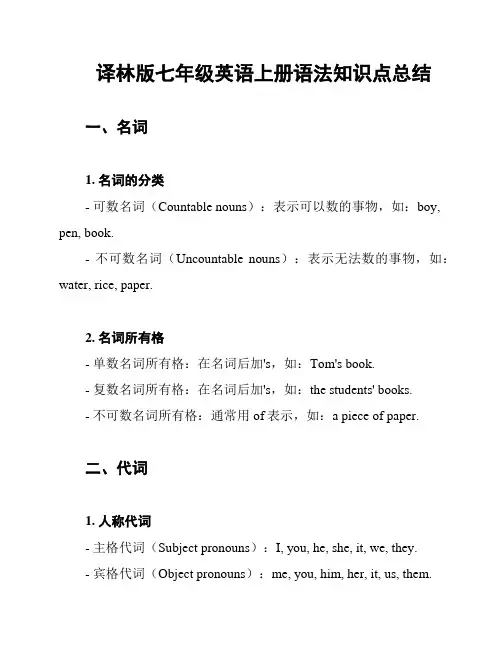
译林版七年级英语上册语法知识点总结一、名词1. 名词的分类- 可数名词(Countable nouns):表示可以数的事物,如:boy, pen, book.- 不可数名词(Uncountable nouns):表示无法数的事物,如:water, rice, paper.2. 名词所有格- 单数名词所有格:在名词后加's,如:Tom's book.- 复数名词所有格:在名词后加's,如:the students' books.- 不可数名词所有格:通常用of表示,如:a piece of paper.二、代词1. 人称代词- 主格代词(Subject pronouns):I, you, he, she, it, we, they.- 宾格代词(Object pronouns):me, you, him, her, it, us, them.2. 物主代词- 形容词性物主代词(Adjective possessives):my, your, his, her, its, our, their.- 名词性物主代词(Noun possessives):mine, yours, his, hers, its, ours, theirs.3. 不定代词- 所有人称:somebody, someone, something, somewhere, sometimes.- 所有人称否定:nobody, no one, nothing, nowhere, never.三、形容词和副词1. 形容词- 形容词用来修饰名词,如:big, small, happy, sad.- 形容词比较级:在形容词后加-er,如:bigger.- 形容词最高级:在形容词后加-est,如:biggest.2. 副词- 副词用来修饰动词、形容词、其他副词或整个句子,如:quickly, slowly, never, always.- 副词比较级:在副词后加-er,如:quicklier.- 副词最高级:在副词后加-est,如:quickliest.四、动词1. 动词的分类- 行为动词(ral verbs):表示动作或状态,如:eat, drink, read.- 系动词(Link verbs):表示主语的状态,如:be, seem, look.2. 动词时态- 一般现在时(Present Simple):描述惯性动作或普遍真理,如:I like apples.- 现在进行时(Present Continuous):描述正在进行的动作,如:She is reading a book.- 现在完成时(Present Perfect):描述过去发生的动作对现在造成的影响,如:I have finished my homework.五、冠词1. 不定冠词- a, an:用于第一次提到的或不特定的名词,如:a book, an apple.2. 定冠词- the:用于特定的或已知的名词,如:the table, the girl.六、介词1. 常见介词- in, on, at, by, with, under, over, een, among.2. 介词短语- look after(照顾),look for(寻找),put on(穿上),take off(脱下).七、句子结构1. 简单句- 主语(Subject)+ 谓语(Verb)+ 宾语(Object),如:She reads a book.2. 复合句八、疑问句1. 一般疑问句- 是否疑问句:Do you like apples?- 存在疑问句:Is there a book on the table?2. 特殊疑问句- 特殊疑问词+ 动词+ 其他,如:What is your name?以上是译林版七年级英语上册的主要语法知识点总结,希望对您有所帮助。
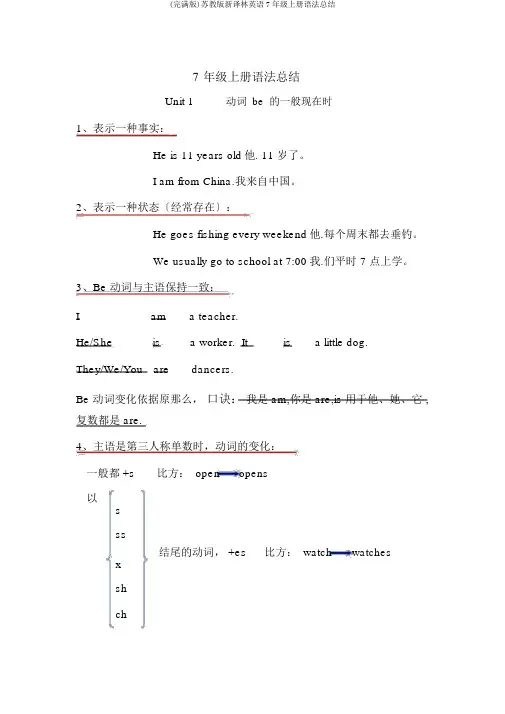
7年级上册语法总结Unit 1动词be的一般现在时1、表示一种事实:He is 11 years old他. 11 岁了。
I am from China.我来自中国。
2、表示一种状态〔经常存在〕:He goes fishing every weekend他.每个周末都去垂钓。
We usually go to school at 7:00我.们平时 7 点上学。
3、Be 动词与主语保持一致:I am a teacher.He/She is a worker. It is a little dog.They/We/You are dancers.Be 动词变化依据原那么,口诀:我是 am,你是 are,is 用于他、她、它 , 复数都是 are.4、主语是第三人称单数时,动词的变化:一般都 +s比方:open opens以sss结尾的动词, +es比方:watch watches xshch辅音字母 +y 结尾的动词, y ies比方:study studies④辅音字母 +o 结尾的动词, +es比方:go goes5、一般现在时的句型变换否认句 be+notShe is in the kitchen.~She is not in the kitchen.They are in the classroom.~Theyare not in the classroom.一般疑问句 be 提前She is in the kitchen.~Is she in the kitchen?—— Yes,she is.—— No,she isn’t.They are in the classroom.~Are they in the classroom?—— Yes,they are.—— No,they aren’t.Unit 2行为动词的一般现在时用法例句I go to school at 7:00 every morning.经常性、习惯性的动作The earth moves around the sun客观事实目前的爱好、能力等She sings very well.1、行为动词形式变化主语行为动词第一人称复数〔we〕/第二人称复原形数〔you〕/第三人称复数〔They〕例句We do our homeworkat home.You have lunch at school. They play basketball after school.第三人称单数〔 He、She、It 〕2、句型变换否认句: do+not/does +not 第三人称单She does her 数homework in theevening.You don’tgo to school on Sunday.He doesn’twork in this shop.句首增加 do/doesDo you play basketball after school?Does John speak Chinese?Unit 3人称代词1、我们常用人称代词表示人或物2、人称代词主格、宾格形式单数复数主格宾格主格宾格第一人称I Me We Us第二人称You You You YouHe Him They Them 第三人称She HerIt It3、主格在句中做主语,一般用在动词前宾格在句中做宾语,一般用在动词、介词后4、有好几个人称代词并列出现时,序次以下:单数: 231 原那么—— you、he and I复数: 123 原那么—— we、you and theyUnit 4表示时间的介词 in、on、at介词用法例子in一天中的早 /中/晚 In the morning/afternoon/evening月份In January/February/March/April季节In Spring/Summer/Autumn/Winter年份In 2021/2021on星期On Sunday/Monday/Tuesday某一天On 1 September某一天的早 /中/晚 On a cold morning/Sunday afternoon特定节日 /一天On Children’s Dayat某一时辰At 8:00年龄At 12 years old频度副词:always>usually>often>sometimes>seldom>neverUnit 5特别疑问句特别疑问词含义例句what什么What‘s your name?Class/grade哪个班级、年级What class/grade are you in? what colour什么颜色What colour do you like?time几点What time is it?when什么时候When do you usually get up? where哪里Where do you live?who谁Who is the man in a blue sweater?why为什么Why are you always late for school?whose谁的Whose pen is this?which哪一个Which is better,the red one or the blue one?how怎么样How do you go to school?many多少〔可数〕How many students are there in your class?much多少〔不能数〕How much milk do you drinkevery day?old几岁How old are you?how often多长时间一次How often do you go to the library?long多长How long is the Yangtze River?多久How long do you watch TVevery day?far多远How far is your home from school?tall多高How tall is the building?注意: when 和 what time 的差异What time 咨询的是详尽时间, when 能够是详尽时间也能够是大体时间。
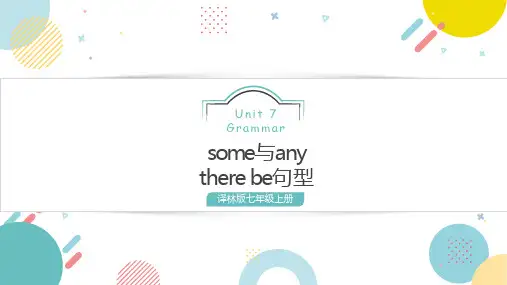

译林版英语七年级上册重点句型语法(总16页)-CAL-FENGHAI.-(YICAI)-Company One1-CAL-本页仅作为文档封面,使用请直接删除新版7A期末复习资料Unit one短语归纳:look after \ take care of 照顾on the first day 在第一天Class 1,Grade 7 7年级1班 play football 踢足球after school 放学后 be\come from 来自be good at \do well in 擅长 fly kite s 放风筝go home 回家 listen to music 听音乐play a game 玩游戏 wear glasses 戴眼镜at school 在学校 all the lessons 所有的课程talk about 谈论 over there 那里a lot of hobbies 许多爱好用法集萃:love\like doing sth 喜欢做某事 let’s +动词原形让我们I am\My name is 我叫 welcome to +地点欢迎来到This is 这是 be good at \do well in doing 擅长做in Class…Grade…在几年级几班 live with…in…和谁住在哪里I’m …year old. 我几岁了。
I have…hair.我留着……头发典句背诵What’s your name你叫什么名字Nice to meet you! 很高兴见到你。
I love reading. 我喜欢阅读Now let’s meet our new classmates. 现在让我们认识下我们的新同学。
I often play football after school.放学后我经常踢足球。
She is tall and slim. 她个头很高,身材苗条。
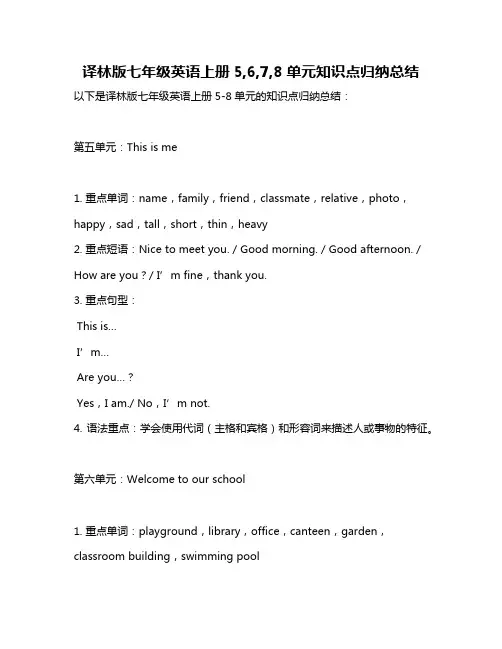
译林版七年级英语上册5,6,7,8单元知识点归纳总结以下是译林版七年级英语上册5-8单元的知识点归纳总结:第五单元:This is me1. 重点单词:name,family,friend,classmate,relative,photo,happy,sad,tall,short,thin,heavy2. 重点短语:Nice to meet you. / Good morning. / Good afternoon. / How are you?/ I’m fine,thank you.3. 重点句型:This is…I’m…Are you…?Yes,I am./ No,I’m not.4. 语法重点:学会使用代词(主格和宾格)和形容词来描述人或事物的特征。
第六单元:Welcome to our school1. 重点单词:playground,library,office,canteen,garden,classroom building,swimming pool2. 重点短语:in the playground/ library / office / canteen / garden / classroom building / swimming pool3. 重点句型:Where is the…?It’s on the…floor.Is there a…?Yes,there is./ No,there isn’t.4. 语法重点:学会使用介词(in,on)和情态动词(there is/ there are)描述场所和事物的位置。
第七单元:My day1. 重点单词:get up,have breakfast,go to school,have lunch,go home,have dinner,do homework,go to bed2. 重点短语:get up at…o’clock / have breakfast at…o’clock / go to school at…o’clock / have lunch at…o’clock / go home at…o’clock / have dinner at…o’clock / do homework at…o’clock / go to bed at…o’cloc k3. 重点句型:What time do you usually…?I usually…at…o’clock.4. 语法重点:学会使用时间介词(at)和时间副词(usually)描述日常活动的时间。
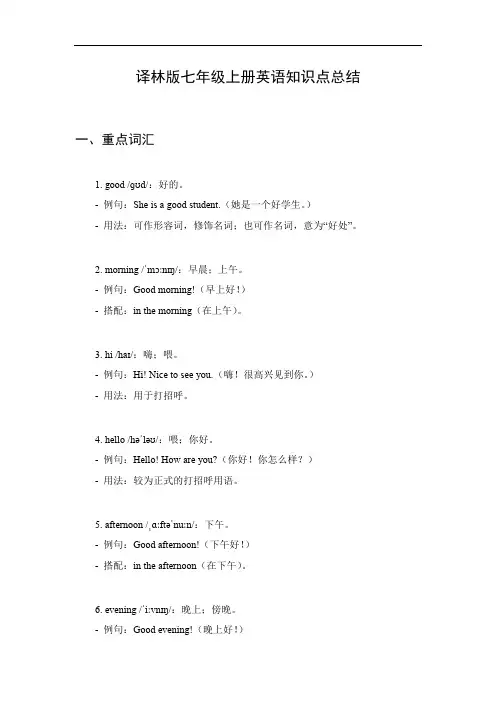
译林版七年级上册英语知识点总结一、重点词汇1. good /ɡʊd/:好的。
-例句:She is a good student.(她是一个好学生。
)-用法:可作形容词,修饰名词;也可作名词,意为“好处”。
2. morning /ˈmɔːnɪŋ/:早晨;上午。
-例句:Good morning!(早上好!)-搭配:in the morning(在上午)。
3. hi /haɪ/:嗨;喂。
-例句:Hi! Nice to see you.(嗨!很高兴见到你。
)-用法:用于打招呼。
4. hello /həˈləʊ/:喂;你好。
-例句:Hello! How are you?(你好!你怎么样?)-用法:较为正式的打招呼用语。
5. afternoon /ˌɑːftəˈnuːn/:下午。
-例句:Good afternoon!(下午好!)-搭配:in the afternoon(在下午)。
6. evening /ˈiːvnɪŋ/:晚上;傍晚。
-例句:Good evening!(晚上好!)-搭配:in the evening(在晚上)。
7. fine /faɪn/:健康的;美好的。
-例句:I'm fine, thank you.(我很好,谢谢。
)-用法:可用于回答“How are you?”。
8. thanks /θæŋks/:谢谢。
-例句:Thanks a lot.(非常感谢。
)-用法:相当于“thank you”,较为口语化。
9. this /ðɪs/:这;这个。
-例句:This is a book.(这是一本书。
)-用法:用于介绍近处的人或物。
10. is /ɪz/:是。
-例句:This is a pen.(这是一支钢笔。
)-用法:用于第三人称单数主语之后。
11. my /maɪ/:我的。
-例句:This is my book.(这是我的书。
)-用法:形容词性物主代词,修饰名词。
12. teacher /ˈtiːtʃə(r)/:老师。
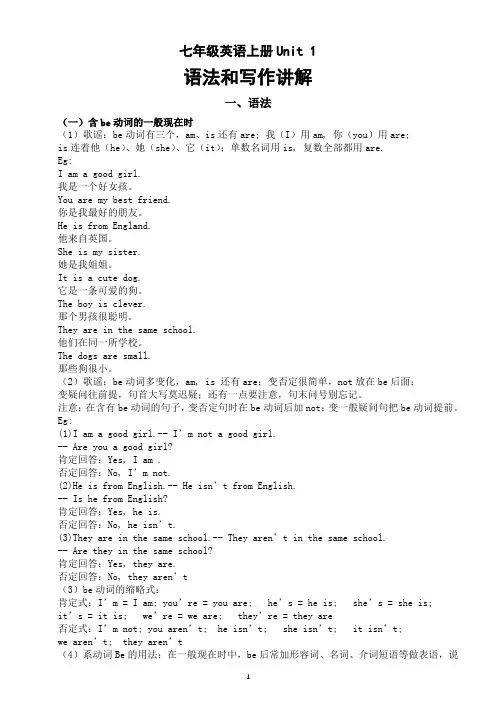
七年级英语上册Unit 1语法和写作讲解一、语法(一)含be动词的一般现在时(1)歌谣:be动词有三个,am、is还有are; 我(I)用am, 你(you)用are;is连着他(he)、她(she)、它(it);单数名词用is, 复数全部都用are.Eg:I am a good girl.我是一个好女孩。
You are my best friend.你是我最好的朋友。
He is from England.他来自英国。
She is my sister.她是我姐姐。
It is a cute dog.它是一条可爱的狗。
The boy is clever.那个男孩很聪明。
They are in the same school.他们在同一所学校。
The dogs are small.那些狗很小。
(2)歌谣:be动词多变化,am, is 还有are;变否定很简单,not放在be后面;变疑问往前提,句首大写莫迟疑;还有一点要注意,句末问号别忘记。
注意:在含有be动词的句子,变否定句时在be动词后加not;变一般疑问句把be动词提前。
Eg:(1)I am a good girl.-- I’m not a good girl.-- Are you a good girl?肯定回答:Yes, I am .否定回答:No, I’m not.(2)He is from English.-- He isn’t from English.-- Is he from English?肯定回答:Yes, he is.否定回答:No, he isn’t.(3)They are in the same school.-- They aren’t in the same school.-- Are they in the same school?肯定回答:Yes, they are.否定回答:No, they aren’t(3)be动词的缩略式:肯定式:I’m = I am; you’re = you are; he’s = he is; she’s = she is;it’s = it is; we’re = we are; they’re = they are否定式:I’m not; you aren’t; he isn’t; she isn’t; it isn’t;we aren’t; they aren’t(4)系动词Be的用法:在一般现在时中,be后常加形容词、名词、介词短语等做表语,说明身份、年龄、状态等。
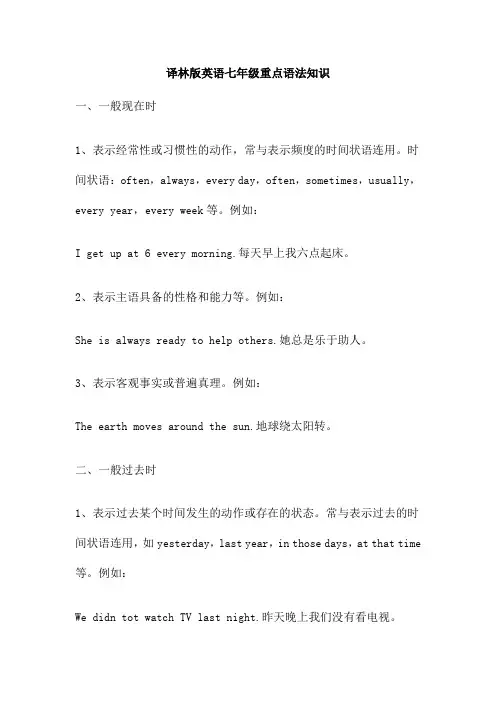
译林版英语七年级重点语法知识一、一般现在时1、表示经常性或习惯性的动作,常与表示频度的时间状语连用。
时间状语:often,always,every day,often,sometimes,usually,every year,every week等。
例如:I get up at 6 every morning.每天早上我六点起床。
2、表示主语具备的性格和能力等。
例如:She is always ready to help others.她总是乐于助人。
3、表示客观事实或普遍真理。
例如:The earth moves around the sun.地球绕太阳转。
二、一般过去时1、表示过去某个时间发生的动作或存在的状态。
常与表示过去的时间状语连用,如yesterday,last year,in those days,at that time 等。
例如:We didn tot watch TV last night.昨天晚上我们没有看电视。
2、表示过去经常或反复发生的动作。
例如:He usually walked to school.他过去常常步行上学。
三、一般将来时1、表示将来某个时间要发生的动作或存在的状态。
常与表示将来的时间状语连用,如tomorrow,next year,next week,in a month,in the future等。
例如:We are going to visit the Great Wall next Sunday.我们打算下周日去游览长城。
2、表示将来经常或反复发生的动作。
例如:It will rn in the future.将来会下雨的。
译林版英语七年级上册语法知识总结一、一般现在时1、表示现在经常发生的动作或存在的状态。
我们通常在行为动词前加助动词如do,does来构成否定句和疑问句,或用时态动词来描述动作发生的时间,如:现在进行时、现在完成时等。
例句:I usually go to school on foot.我通常步行上学。
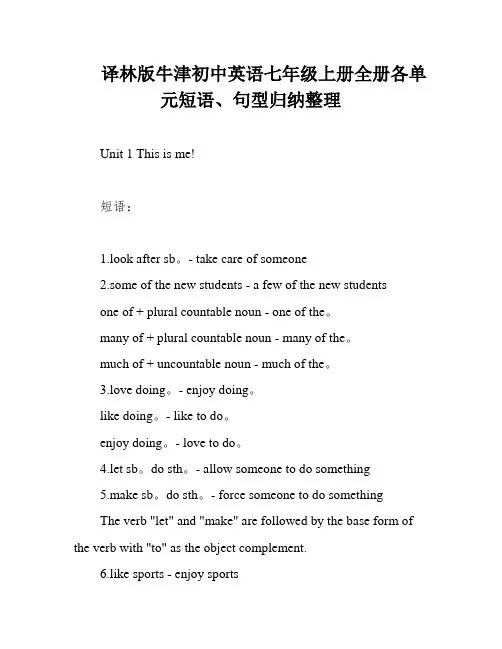
译林版牛津初中英语七年级上册全册各单元短语、句型归纳整理Unit 1 This is me!短语:1.look after sb。
- take care of someone2.some of the new students - a few of the new studentsone of + plural countable noun - one of the。
many of + plural countable noun - many of the。
much of + uncountable noun - much of the。
3.love doing。
- enjoy doing。
like doing。
- like to do。
enjoy doing。
- love to do。
4.let sb。
do sth。
- allow someone to do something5.make sb。
do sth。
- force someone to do somethingThe verb "let" and "make" are followed by the base form of the verb with "to" as the object complement.6.like sports - enjoy sports7.after class - after the classin class - during the class8.be good at (doing)。
- be skilled at (doing)。
9.meet my new friends - meet my new classmates10.over there - in that n11.tell sb。
about sth。
- inform someone about something12.Oh。
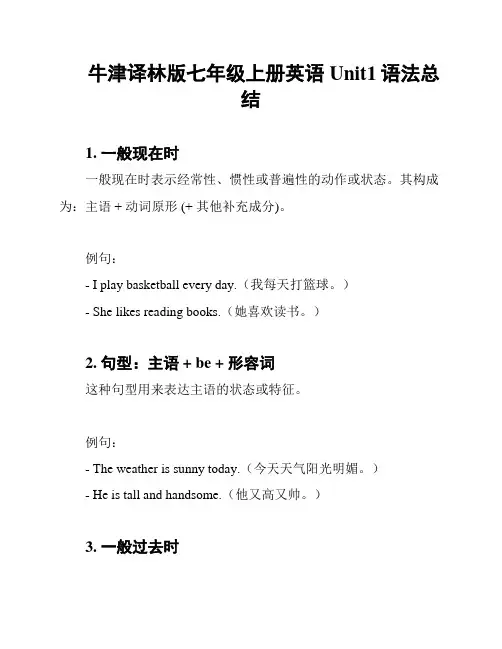
牛津译林版七年级上册英语Unit1语法总结1. 一般现在时一般现在时表示经常性、惯性或普遍性的动作或状态。
其构成为:主语 + 动词原形 (+ 其他补充成分)。
例句:- I play basketball every day.(我每天打篮球。
)- She likes reading books.(她喜欢读书。
)2. 句型:主语 + be + 形容词这种句型用来表达主语的状态或特征。
例句:- The weather is sunny today.(今天天气阳光明媚。
)- He is tall and handsome.(他又高又帅。
)3. 一般过去时一般过去时用来表示过去某个时间发生的动作或存在的状态。
其构成为:主语 + 动词过去式 (+ 其他补充成分)。
例句:- They went to the park yesterday.(他们昨天去了公园。
)- We lived in Shanghai five years ago.(我们五年前住在上海。
)4. 句型:主语 + be + 动词-ing这种句型用来表示主语正在进行的动作。
例句:- I am studying English now.(我现在正在研究英语。
)- They were playing soccer in the park yesterday.(他们昨天在公园踢足球。
)5. 一般将来时一般将来时用来表示将来某个时间将要发生的动作或存在的状态。
其构成为:主语 + will + 动词原形 (+ 其他补充成分)。
例句:- We will have a party next week.(下周我们将举行一个派对。
)- She will visit her grandparents tomorrow.(她明天将去看望她的祖父母。
)6. 句型:主语 + be + going to + 动词原形这种句型用来表示主语打算或计划将要发生的动作。
例句:- I am going to meet my friends this afternoon.(今天下午我将去见我的朋友。
7A Unit4School daysWelcome to the unit1 学习是打开世界的钥匙Learning is the key to unlocking the world.2 ★做某事的关键the key to doing...3 学习如何谈论我们的学校生活learn how to talk about our school life4 吃早饭/午饭/晚饭have breakfast/ lunch / dinner 【三餐前不加the】5 ★做早操/眼保健操do morning/eye exercises 【exercise:操练,练习可数】6 ★做更多的锻炼do/take more exercise 【exercise:锻炼不可数】7 ★做课后活动do after-school activities8 帮助家务help with housework9 ★在工作日on weekdays10 在周末at/on weekends = at/on the weekend11 去短暂的慢跑go for a short jog12 ★加入排球俱乐部join the V olleyball Club13 读了一点read a little14 ★玩的开心enjoy oneself = have fun = have a good time15 ★做某事的方法way to do...= way of doing=how to do...16俱乐部活动是我玩的愉快并结交朋友的好方法Club activities are s good way for me to enjoy myself and makefriends.Reading17 我的第一个学期my first term18 我最喜欢语文I like Chinese best.= My favourite subject is Chinese.19 阅读许多著名作家的作品read the works of many famous writers20 ★因为.....而著名be famous for......21 ★作为.....而著名be famous as......22 中国语言令人惊奇The Chinese language is really amazing.23 研究许多活物study many living things24 了解大自然learn about nature25 ★练习做某事practise doing....26 有一个野外考察have a field trip27 ★动身去,到....地方去leave for28 ★收到某人来信hear from sb = get a letter from sb.29 ★希望做某事hope to do ..... 【没有hope sb to do sth】30 希望不久收到你的来信Hope to hear from you soon.31 ★我在校排球队I am in the school volleyball team.=I am a member of the school volleyball team32 明天早晨我们将到公园去摘苹果Tomorrow morning we will leave for a farm to pick apples.33 我们在周二和周四上生物课We have Biology classes on Tuesdays and Thursdays.34 我想要告诉你关于我的学校生活I would like to tell you about my school life.35 ★说一点中文speak a little Chinese36 ★迫不及待做某事can’t wait to do...37 一切顺利All the bestGrammar ---Further studyFurther study38 ★没有许多时间去打网球don’t have much time to play tennis39 在体育场on the sports field40 ★去溜旱冰go roller skating41 跳舞半小时dance for half an hour42 学习如何种植苹果learn how to grow apples43 长大grow up44 帮助种树help plant trees45 在学校网站上on the school website46 看视频watch a video 【video 复数videos】47 参观田野have a tour of the fields48 带一些苹果回家take some apples home49 我喜欢呆在外面I like being outside.50 ★亲近大自然是好的It’s nice to get close to nature.51 ★享受和平和安静enjoy the peace and quiet52 ★每个人都竭尽全力让事情变得更好Everyone tries their best to make things better.53 竭尽全力,尽某人最大努力做某事try one’s best to do....54 ★有时候野外考察对我来说太累了Sometimes field trips are too tiring for me.55 保持我们学校区域干净感觉很好It feels good to keep our school area clean.56参加take part in = join in57帮助我学习如何照料植物help me learn how to take care of plants58轮流去做不同的值日任务take turns to do different chores59小组合作work in groups60给植物浇水water the plants61清空垃圾桶empty the bins62通过值日,我们每个人都为班级做事并学会团队合作We each do something for our class and learn about teamworkthrough chores.7A Unit4School daysWelcome to the unit1 学习是打开世界的钥匙2 ★做某事的关键3 学习如何谈论我们的学校生活4 吃早饭/午饭/晚饭5 ★做早操/眼保健操6 ★做更多的锻炼7 ★做课后活动8 帮助家务9 ★在工作日10 在周末11 去短暂的慢跑12 ★加入排球俱乐部13 读了一点14 ★玩的开心15 ★做某事的方法16俱乐部活动是我玩的愉快并结交朋友的好方法Reading17 我的第一个学期18 我最喜欢语文19 阅读许多著名作家的作品20 ★因为.....而著名21 ★作为.....而著名22 中国语言令人惊奇23 研究许多活物24 了解大自然25 ★练习做某事26 有一个野外考察27 ★动身去,到....地方去28 ★收到某人来信29 ★希望做某事30 希望不久收到你的来信31 ★我在校排球队32 明天早晨我们将到公园去摘苹果33 我们在周二和周四上生物课34 我想要告诉你关于我的学校生活35 ★说一点中文36 ★迫不及待做某事37 一切顺利Grammar ---Further studyFurther study38 ★没有许多时间去打网球39 在体育场40 ★去溜旱冰41 跳舞半小时42 学习如何种植苹果43 长大44 帮助种树45 在学校网站上46 看视频47 参观田野48 带一些苹果回家49 我喜欢呆在外面50 ★亲近大自然是好的51 ★享受和平和安静52 ★每个人都竭尽全力让事情变得更好53 竭尽全力,尽某人最大努力做某事54 ★有时候野外考察对我来说太累了55 保持我们学校区域干净感觉很好56参加57帮助我学习如何照料植物58轮流去做不同的值日任务59小组合作60给植物浇水61清空垃圾桶62通过值日,我们每个人都为班级做事并学会团队合作。
译林版英语七年级上册笔记一、Unit 1 This is me!1. 重点单词。
- e - dog:电子狗。
例如:I have an e - dog. Its name is Hobo.(我有一只电子狗。
它的名字叫霍波。
)- master:主人。
常搭配为“be the master of...”,表示“是……的主人”,如:I am the master of my life.(我是我生活的主人。
)- grade:年级;等级。
如:I'm in Grade 7.(我在七年级。
)也可用于表示成绩等级,如“get a good grade”(取得好成绩)。
- student:学生。
复数形式是“students”。
例如:There are many students in our school.(我们学校有很多学生。
)- reading:阅读;读物。
“like reading”(喜欢阅读),“do some reading”(阅读,做阅读练习)。
2. 重点短语。
- look after:照顾;照料。
等同于“take care of”。
例如:My mother looks after my little sister every day.(我妈妈每天照顾我的小妹妹。
)- welcome to...:欢迎来到……。
如:Welcome to our school.(欢迎来到我们的学校。
)- be from:来自。
可与“come from”互换。
例如:He is from Nanjing. = He comes from Nanjing.(他来自南京。
)3. 重点句型。
- Nice to meet you. /Nice to meet you too.:用于初次见面时互相打招呼。
- I love reading. / I like playing football.:表达爱好的句型,“love/like + doing sth.”表示喜欢做某事。
七上重要句型及知识点讲解7A Unit 1 This is me. (强化:第三人称单数的概念及相应变化及be动词因不表示具体动作而可以提前)R: 1. I am = I’m twelve years old.2. Millie is in Class One, Grade Seven. → Is she in Class 2, Grade 7?3. I live in Beijing. → Does he live in Donghai? → He doesn’t live he re. (从此时开始,就应不断强化一个观念:表示动作的动词不能提前,不能加n’t,只有助动词才有这些功能。
)4. I love reading. (love之后不能用read的原形形式,否则犯了“两行为动词原形连用”的大忌)5. I often play football after school. (汉语说“我喜爱放学后踢足球”,“放学后”在动词前,而英语却是经常相反的。
学英语不可不注意这样的现象。
)6. He is good at Math.7. I have long hair. = My hair is long.G: 8. I am happy. → I am not happy.9. They are happy. → They are not happy. → Are they happy? Yes, they are. / No, they aren’t.10. She is happy. → She is not happy. → Is she happy? Yes, she is. / No, she isn’t.特别说明:英语是“形合”语言,其主要体现是动词(比如am、is、are)的形式要随着主语形式(如I、they、she)的变化而变化,且相当有规律。
I: 11. Her hair is long.12. She loves dancing. (love如果不加s,在形式上就和主语she不统一了,违背了“形合”这一英语的根本原则。
7A 短语和句子n.名词v.动词vt.及物动词vi.不及物动词adj.形容词adv.副词prep.介词pron.代词conj.连词Unit 1 This is me1.look after sb. 照顾某人2.some of the new students 新学生中的一些one of + 可数名词复数…..中的一个many of + 可数名词复数…..中的许多.much of + 不可数名词…..中的许多3.love doing…. 热爱/喜爱做….like doing….喜爱做….enjoy doing…. 喜欢/享受做…sb. do sth. 让某人做某事5.make sb. do sth. 使某人做某事使役动词let, make后面接省to的动词不定式充当宾语补足语、6 like sports 喜爱运动7 after class 课后in class 在课上8. be good at doing…… 擅长做某事=do well in doing……my new friends 见见我的新同班同学there 在那边11. tell sb. about sth. 告诉某人关于某事12. Oh, I see. 哦,我明白了;13. wear glasses 戴着眼镜14. like all the lessons 喜欢所有的功课15. need作为行为动词的用法:need to do don’t / doesn’t need to do16.twelve years old 12岁17. \come from 来自于句子:1.How to look after your e-dog.如何照顾你的电子狗;2.I have short hair. = My hair is short. 我短发;3.Let’s meet my new classmates. 让我们见见我的新同学;4. She is tall and slim. 她高而苗条;5. Daniel is from Nanjing. Daniel来自南京;=Daniel comes from Nanjing.6. She loves dancing. 她热爱舞蹈;7. She is good at swimming. 她擅长游泳; = She does well in swimming.8. This is my cousin Andy. 这是我的表弟Andy.9. Andy, this is my new classmate Kitty. Andy, 这是我的新同学Kitty.10. I come from Nanjing, but now I live with my family in Beijing.我来自南京,但现在我和父母住在北京;11. They are all very nice. 他们都很好;Unit 2 Let’s play sports1. play sports 做运动 6. Walk to my bowl 走到我的碗边2. like walking 喜欢散步go for a walk 去散步take a walk 散步3. enjoy oneself = have a good time 玩得开心= have fun = play happily4. be free 有空be busy 繁忙5. hope to do sth. 希望做某事hope that + 句子希望+ 宾语从句7. come true 梦想实现,成为现实8. at/on weekends = at / on the weekend 在周末9. of course = certainly = sure 当然10. Many of my students 我的许多学生11. else 放在不定代词或疑问代词之后something else 别的东西what else 别的什么,还有什么12. a lot of = lots of 许多修饰可数名词、不可数名词some 一些修饰可数名词、不可数名词many 许多修饰可数名词much 许多修饰不可数名词13. fun 不可数名词乐趣、享乐、有趣的事What great fun 多么有趣的事啊14. talk about 谈论talk of 谈到,说到15. hero – heroes16. many times a day 一天很多次once a week 一周一次twice a month 一月两次tree times a year 一年三次17.my favourite football player 我最喜爱的足球队员18. a new member of Huanghe Football Club黄河足球俱乐部的一个新成员19. look strong 看起来强壮20. play football very well 足球踢得很21. in one’s free time 在某人的空余时间里22. enjoy listening to music 喜欢听音乐23. make sb. do sth. 使某人做某事make sb. + adj. 使某人……make him happy 使他们开心make me sad 使我悲伤24. activity ---- activities 活动25. watch ball games on TV 在电视上看球赛26. 对sometimes, often, usually, always, never, once a week, twice a month等表示频率的词或短语提问用how often / how about ……怎么样句子:1. Are you free = Do you have time 你有空吗2. What’s your favourite sport 你最喜欢的运动是什么3.He also enjoys listening to music. 他也喜欢听音乐;4. Li Hua wants to play in the next World Cup. 李华想参加下届世界杯;5.I hope his dream comes true. 我希望他的梦想实现;6.How does he look 他看上去怎样What does he look like 他看上去像什么7. Do your parents go with you你父母和你一起去吗8. My dad sometimes watches our games. 我爸爸有时候观看我们的比赛;9. My mum often shops at weekends. 我妈妈常在周末购物;10. I often stay at home. 我常待在家里;11. Many of my students like sports我学生中的许多喜欢运动;/我的许多学生喜欢运动;12. What else do you like to do你还喜欢做别的什么事吗13. It makes me feel great. 它使我感到很棒;14. I like reading too. 我也喜欢阅读;15. Me, too. Reading is fun. 我也是;阅读很有趣;16. I often play basketball with my friends after school. 我常在放学后与朋友一起打篮球;Unit 3 Welcome to our schoolthe Open Day 在开放日 2. be ready to do…. 准备好做….parents’ meeting 家长会4. at the school gate=at the gate of the school在学校大门口5. so big 如此大6. watch two of our lessons 观摩我们的两节课7. let me show you around 让我带你参观the ground floor 在一楼英9. this way 这边走10. by the way 顺便说说,顺便问一下11. have a meeting / have meetings at the school hall 在学校礼堂开会12. classroom building 教学楼14. be nice / kind to sb. 对某人好15. It’s very nice/kind of you to do sth.你做某事真好a diary diaries 写日记17. want to say hello to sb. 想向某人问好18. say goodbye to sb. 向某人告别say sorry to sb. 向某人道歉19. get to school 到达学校20. take the bus to school 乘公交车上学=go to school by bus=go to school on a / the bus21. ride a bike to school 骑自行车上学=go to school by bike=go to school on one’s bike23. live near the school 住学校附近24. live far away from the school 住得远离学校25,all kinds of books 各种可样的书26. borrow sth. from sb. 跟某人借某物27. borrow books from the library从图书馆借书28. on one’s way back 在某人回来的路上29. on one’s way home 在某人回家的路上30. on one’s way to school 在某人上学的路上31. Thank sb. for sth. 因为某事谢谢某人32. Thank sb. for doing sth. 为干某事谢谢某人you / Thanks for telling me how to have a party.谢谢你告诉我怎样举办一个晚会;34. all the best 一切顺利,万事如意35. write to sb. 给某人写信=write a letter letters to sb.句子:1. What’s your favourite subject=What subject do you like best2. Which of the subjects do you like best 这些科目中你最喜欢哪个’s the date today 今天几号=What date is it today’s that man in a white shirt 穿白衬衫的那个人是谁5. Our school is really nice. 我们学校真好;6. I can’t hear you well on the phone.在电话里我听不清你的话;7. It’s a long way from my home to the school.从我家到学校有很长一段路;8. The reading room is open. 阅览室是开着的9. ----When is it open 它什么时候开放-----It’s open from 8 . to 5:30 它从早上8点到下午5点半开放;10. It takes me about an hour to get to school.我到达学校大约要花费一个小时;11. What school do you study at你在哪个学校学习Unit 4 My day1. wake up 醒来2. between...and... 在...和...之间3. It’s time for sth. It’s time for sb. to do sth. 是某人干某事的时候了4. go walking in the hills 去山上散步5. seldom go out 很少外出6. need a good rest 需要好好休息=need to have a good rest7. need to do sth. 需要做某事8. From Monday to Friday 从周一到周五9. do morning exercises 做早操10. do eye exercises 做眼保健操11. do some exercise 锻炼12. have lessons 上课13. start begin lessons 开始上课14. do after-school activities 做课外活动15. be never late for work / school 上班/ 上学从不迟到16. one of ….. …….之一;后接可数名词复数17. be all nice to sb. 都对某人很好18. chat with sb. 和某人聊天19. chat with each other 互相聊天20. help each other 互相帮助21. play in the playground 在操场上玩22,be in the school volleyball team是校排球队成员=be a member of the school volleyball team23. practise after school 放学后训练practise doing sth. 练习/训练做某事24. on Wednesday afternoon 在周三下午25have a good time doing sth=have fun doing sth. 做某事过得愉快26. in spring / summer / autumn / winter 27. at 6 years old =at the age of 6 在六岁28. all the best 一切顺利,万事如意29. have much time to do sth. 有很多时间做某事30. have no time to do sth. 没有时间做某事31. go to her dancing lessons 去上舞蹈课32. dance for half an hour 跳舞半小时33. go roller skating 去溜旱冰34. visit a museum 参观博物馆on picnics with my family twice a month 一个月两次和我家人去野餐36..be good for sb. 对...有益37..be bad for sb. 有…..害38. get ready for sth 为...做好准备get ready to do sth 准备好做某事=be ready to do sth.39.. learn a lot about sth 关于某事了解很多40.. learn more about sth. 关于某事了解更多41. too much homework 太多作业42. too many lessons 太多课43. much too cold hot太冷热句子:1. Some dogs just don’t know how to have fun. 有些狗就是不知道怎样玩乐;2. What time do you start lessons 你们什么时候开始上课3. Our lessons begin at a quarter past eight. 我们的课于8:15开始;4.We have a Reading Club. 我们有一个阅读俱乐部;5.I also like playing volleyball. 我也喜欢打排球;6. We always have a good time at school.我们在学校总是过得很开心;7. Millie seldom chats with her friends after 很少与朋友在课后闲聊;8. I would like to tell you about my life here我想告诉你我在这儿的生活;9. We do not have lessons on Saturday or Sunday. 我们在周六和周日不上课;10. How often do they exercise 他们多久锻炼一次11. I hope everyone can come and watch the game. 我希望每个人能来看比赛;Wish our team good luck 祝我们队好运They help us get ready for the day他们帮助我们为一天做好准备;Unit 5 Let’s celebrateup 打扮 2.. dress up as a ghost 乔装打扮成鬼a guess 猜一猜 4. at Christmas = on Christmas Day 在圣诞节Festival中秋节 6. enjoy the full moon赏满月7. knock on / at people’s doors 敲人们的门8. play a trick on sb. / play tricks on sb.捉弄某人9. seem + adj. He seems very happy. seem to do… He seems to be very happy.He seems to like apples. It seems that + 句子; It seems that he is very happy. 他似乎很开心;10. be different from… 与…不同11 wear masks 戴面具12. have a party 开派对13. learn about different festivals around the world 了解全世界不同的节日14. a special day 特别的一天15. make pumpkin lanterns 做南瓜灯16. make lanterns out of pumpkins 把南瓜做成灯houses 串门18.. play a game with the people inside和里面的人做一个游戏dance 舞狮out 找到,发现 a lot of photos 拍很多的照片the world = all over the world全世界23. paint one’s face 给脸涂色24. on the evening of….. 在…..的晚上us some candy as a treat 给我们一些糖果作为招待= give us a treat of candy26 fun 不可数名词much fun 很多乐趣have lots of fun = have great fun 玩得开心What great fun 多么大的乐趣27. on Halloween 在万圣节前夕28. at a restaurant near my home 在我家附近的一家餐馆29. some other nice things 一些别的好东西30. what other things = what else 别的什么东西31. on the radio 在收音机里32 let off fireworks 放烟火33. watch the fireworks 看烟火34. a music and dance show一场音乐舞蹈表演35. most Chinese families 大多数中国家庭36.. at this time of year 在一年的这个时候句子1. Let’s celebrate. 让我们庆祝;2. What is your favourite festival =What festival do you like best 你最喜欢的节日是什么3. All my family get together and have a big dinner. 我所有的家人聚集在一起吃大餐;4. Thank you for telling me about the Mid- Autumn Festival. 谢谢你告诉我中秋节的情况;5. Children have lots of fun on that day. 在那天孩子们有很多的乐趣;’s really a special day. 这真是特殊的一天;7. Family members get together and give each other presents. 家庭成员聚集在一起并互送礼物;8. How do you usually celebrate your birthday 你通常怎样过生日9. What do you get as birthday presents 你得到什么作为生日礼物10. The Spring Festival is an important festival in China. 在中国春节是个重要的节日;11. I am on holiday in New York. 我在纽约度假;12. What do you do to celebrate the Chinese New Year in Beijing 你们在北京做什么事庆祝春节13. There is a great Spring Festival Gala on TV every year. 电视上每年都有盛大的春节联欢晚会;14. Children have lots of fun on this day. 孩子们在这一天玩得很开心;15. Usually our parents get new clothes ready for us. 我们的父母为我们准备好新衣服;16. We get red packets from our parents. 我们从父母那得到压岁钱;17. They are really wonderful. 他们真的很精彩Unit 6 Food and lifestyle1. all kinds of food 各种各样的食物2. keep fit = keep healthy 保持健康……away 远离4. plan to do… 计划做…planning5. more than 超过,多于6. dance for half an hour every day每天跳舞半小时7. feel hungry between meals在两餐之间感到饿8. Too much sugar 太多糖my lifestyle 改变我的生活方式swimming pool 一个游泳池11. four kilos of meat 四公斤肉12. five cartons of milk 五盒牛奶13. how to keep fit 如何保持健康14. less than 3 times a week 少于一周三次three to six times a week 一周三到六次15.exercise more 多运动16.eat less 少吃17.Have a look 看一看18. take a walk 散步19. All right,好的,行the day well 很好的开始一天21. taste good 尝起来不错;此处taste 为系动词22.. have a healthy lifestyle 有一个健康的生活方式句子1. It’s good for our health. 这对我们的健康有益;2. Healthy food is important for me.= It’s important for me to have healthy food.健康食物对我很重要;/对于我来说吃健康食物很重要;3. They have too much sugar and are bad for my teeth. 他们有太多的糖并对我的牙齿有害;4. I need to change my lifestyle now. 现在我需要改变我的生活方式;5. I plan to eat more fruit and vegetables every day. 我计划每天吃更多水果蔬菜;6. You need to exercise more and eat more healthy food.你需要多加锻炼并多吃健康食品;7. I seldom eat cakes or sweets. 我很少吃蛋糕和糖果;7. Let me have a look at the menu. 让我看一看菜单;8. What would you like to order 你们想要点什么9. Apple juice tastes good. 苹果汁尝起来不错;10. I often play football to keep fit. 我常踢足球保持健康;helps me start the day well. 这帮助我很好的开始一天;12. This meal gives me energy for the whole afternoon. 这顿饭为我整个下午提供能量;13. We need them to keep healthy. 我们需要他们来保持健康;14.. An apple a day keeps the doctor away. 一天一苹果,医生远离我;Unit 7 Shopping1. come with me 跟我来2. need sb. to do sth. 需要某人做某事3. flower / shoe /gift shop 花/鞋/礼品店clothes / sports shop 服装店/体育用品商店4. go shopping = do some shopping = buy some things 购物/买东西5. hate doing…/ hate to do…. 讨厌做….6. be interested in doing sth. 对做…感兴趣the street 沿着这条街8. be sure 确信、相信9. just a minute = wait a minute = wait a moment = wait for a short time 稍等片刻10.enough修饰adj./adv.时喜欢放在后good enoughenough修饰n.时常放在前面enough moneyall the bags 拎所有的包12. wait for….. 等待…13. be different from… 与….不同14. the same as…. 与…一样15. another 又一,另一,用于三者或以上a look看一看much 多少钱18. price用高、低high, low形容,不用贵、便宜形容19. . buy Simon a present 买给西蒙一个礼物= buy a present for Simon 为西蒙买一个礼物20. last year’s cards 去年的卡片21. different kinds of hair clips 不同种类的发卡22. go well with… 与…很配23. help the children in some poor areas帮助一些贫困地区的孩子24. walk a long way to school 走很长的路上学25. try on 试穿26. one floor of restaurants 一个楼层的饭馆27.. on the top floor 在顶楼句型1.There’s a new mall down the street.沿着这条街走有一个新建的大型购物中心;2.What can I help you/Can I help you您需要什么3.How much do they costHow much are they他们多少钱’ll take /buy them.我就买它们;5.. Not far away from my school, there is also a supermarket. 离我学校不远也有个超市;need books most. 他们最需要书;7.. We can use our pocket money to buy them these things. 我们可以用零用钱买给他们这些东西;8. Thank you for your help. 谢谢你的帮助;9.. What’s your size Size 40. 你穿几码40码;10.. They fit very well. 他们很合适;11. Can we see another pair 我们可以再看一双吗12.. There are five floors of shops. 有五层楼的商店;13. There are foods from different areas. 有来自不同地区的食物;14.. The mall is a good place to meet friends and have fun.这个购物中心是与朋友见面和玩乐的好地Unit 8 Fashion1. spend +时间/钱+ on sth. 花时间/钱在..上.spend +时间/钱+ in doing sth.花时间、钱做某事2. so lazy 如此懒惰3.. sports clothes 运动服4. lend sth. to sb. = lend sb. sth.把某物借给某人5.. borrow sth. from sb. 跟某人借某物6.. between ….and …在...与…之间用于两者之间7. be made of… 由….制成能看出原材料be made from…由….制成不能看出原材料be made in + 地点产于某地be made by + 人被…制造8.下列的fit 为adj. be fit for …. 适合于…They are fit for a long walk. 他们适合长时间步行14. 下列fit为v. They fit me very well. 他们很适合我;The coat doesn’t fit me.那件外套不适我;15. ten more minutes = another ten minutes 再多10分钟16. hold / have/ give a fashion show 举办一个时装展17. design a poster for the “Fashion Wall”给Fashion Wall设计一张海报18. show you different styles of clothes给你看不同式样的衣服19. look smart / modern and beautiful 看起来时尚和漂亮20.. look great in white创白色很棒21. both of them 他俩都22. a black wool skirt 一件黑色羊毛短裙23. a pair of long red leather boots 一双红色长筒皮靴24. 感叹句的构成:1、What + n.短语+ 主语+ 谓语What a great show it is 这是多棒的表演啊What tall buildings they are 他们是多高的楼啊What fine weather it is 这是多好的天气啊2、How + adj./adv. + 主语+ 谓语How great the show is 表演多棒啊How tall the buildings are 这些楼多高啊How fine the weather is 天气多好啊25.most young people 大多数年轻人26. wait for the school bus 等校车27. lie on the bed 躺在床上28. go for a dinner 去赴宴29. have to do sth. 必须/不得不做某事30. feel soft and smooth 摸上去柔软光滑句型1. What do you think of …. = How do you like ….. 你认为….怎么样2. I’m thinking about what to wear. = I’m thinking about what I should wear.我正考虑穿什么3. I can spend ten more minutes in bed then. 那么我可以在床上多待10分钟了;4. Would you like one more apple = Would you like another apple 你想再要一个苹果吗5. Can you lend us your red blouse for our fashion show, Mum妈妈,你能把你的红衬衫借给我们参加时装表演吗6. What size is your blouse Size 4. 你的衬衫是什么尺寸大小4;7. Trainers are light and comfortable and are popular among young people.8. Here comes Simon. 西蒙走来了;9. That’s all for today’s show.= So much for today’s show. 今天的表演到此结束;for coming. 感谢光临;11. You look great in your purple shirt. 你穿紫色衬衫看起来棒;12. The purple shirt looks great on you. 紫色衬衫穿在你身上看起来棒;13. That pair of long boots is made of leather. 那双长靴是皮革制成的;14. The jacket is not too long or too large. 这夹克不太长也不太大;15. My design includes a pair of blue jeans. 我的设计包括一条蓝色牛仔裤;。
Unit1-Unit4重点句型及知识点一、重点句型。
1.how to do sth 怎样做某事2. like/love/enjoy doing sth喜欢做某事3.let sb do sth 让某人做某事4. nice/glad to meet you 很高兴见到你5.be good at doing sthdo well in doing sth 擅长做某事be good at playing football= do well in playing football= play football (very) wellBe good at English= do well in English= study English well6.be nice to sb 对某人好7.live with sb in ……和某人住在某地e from=be from 来自9. go+动词ing形式go swimming, go shopping,go walking 10.walk to school= go to school on footwalk home, home前面不加 to11. favourite =like best12. be in the football team= be a member of the football team13.look +形容词,look modern/strong14. make sb +形容词 make me happy15.make sb do sth, 使某人做某事make me feel great,make me look strong 16. want to do sth= would like to do sth 想要做某事Do you want to………?= Would you like to……?17. hope + 句子I hope his dream comes truehope to do sthI hope to buy a bike.18.reading is fun 动词做主语用ing形式Swimming is interesting.动作是不可数的Doing morning exercises is good for you 19. talk about doing sth/sthtalk about playing computer games. 20.what else…? 其他什么Who/where else…? 21. the man in……穿…衣服的男人22.tell sb about sth 告诉某人关于某事23. say hello to sb 向某人打招呼say thanks/goodbye to sb向某人道谢、道别24. talk on the phone 在电话里交谈25. go to school by bike/ on my bike ride to school骑自行车上学三种说法go to school by car/ in my cardrive to school开车上学三种说法go to school by bus/ on the bus take a bus to school开车上学三种说法注意介词用法go to Beijing by planetake a plane to Beijingfly to Beijing 乘飞机去北京26. It takes sb some time to do sth事情做主语,“花费”用takesb spend some time/money doing/on sth 人做主语,“花费”用spend,动词doing,名词用on27. be open/be closed 开门/关门28. borrow sth from sb 向某人借lend sth to sb 借给某某人keep + 时间区分三个借29. thank sb for sth 感谢某人做某事 thank sb for doing sth30. a few/few 修饰可数名词,一些/很少a little/little,修饰不可数,区分31. reading lesson/room, Reading Club动词加名词,在动词后面加ing形式 drawing/swimming/dancing lesson 32. it is a long way from my home to myschool= I live far (away) fromschool. away 可以省略注意:具体数字和far不能同时使用I live five kilometers far from…错句33. It is time for sth 区分名词和动词 It is time to do sth34. Shall we do sth ? 提建议35. need sth/ need to do sth需要某物,需要做某事36. have fun/ a good time doing sth做某事玩得开心37. practice doing sth 练习做某事38. have (no) time to do sth有时间/没有时间做某事have much time to do sth39. between …and 在什么和什么之间 from…to…从…到…40. wish sb sth 祝愿某人某事Wish you a happy birthday/new year 41.对once/twice 提问用how many times对once a week提问用 how often42. help sb do/to do sth帮助做某事43. too much 加不可数名词too many 加可数名词much too 加形容词或者副词二、重点词组1. look after sb well 照顾好某人2. I have short hair= My hair is short.3. like/love sports 注意复数4. after school/class 放学后/下课后5. over there 在那里6. 问某人长相How does he look?What is he like?What does he look like?7. wear glasses 注意复数8. they are all nice to me9. once a week/ twice a monthmany times a day注意one和two的变化,one-once-first 理解句义,填哪一个词two-second-twice10. be a (new) member of Reading Club俱乐部两个词都要大写11. in his/my/our free time在..空闲时12. make him happy/feel happy/great13. the next World Cup 下一届世界杯14. come true 实现15. watch ball games/ football matches 16. at/on weekends, at/on the weekend17. sure/of course 当然18. stay at home 呆在家里19. What else do you like to do?20. they are my heroes. 注意复数形式21. it is fun to do sth.22. what’s the date today?What day is it today? 区分两句话23. Open Day24. parents’ meeting25. let’s meet at the school gate.26. show sb around 带领某人参观27. in front of 范围外的前面behind 范围外的后面in the front of 范围内的前面at the back of范围内的后面28. on the ground floor 在底楼29. have meetings in the school hall30. look at the pictures of my friends31. on the wall 在墙上32. hear you well on the phone33. do morning exercises 注意复数34. do after-school activities复数35. go to bed 上床睡觉36. get up/ get to school early/late37. it takes her about ten minutes toget to school38. all kinds of/different kinds of各种各样的/不同种类的39. thanks=thank youthanks for your letter/e-mailthanks for helping me40. live far (away) from schoollive near the school41. best wishes/all the best42. wake up/ wake sb upwake me/him/us up 代词必须放在中间43. I seldom/often/never go out44. need (to have)a good rest45. how to have fun 怎样获得乐趣46. I am never late for schoolbe late for 迟到47. start lessons 开始上课48. chat with sb about sth。
译林版英语七年级上册重点句型语法Unit OnePhrases:look after/take care of: to take care ofon the first day: on the first dayClass 1.Grade 7: 7th grade。
1st classplay football: to play soccerafter school: after schoolbe/come from: to come frombe good at/do well in: to be good atXXX: to fly kitesgo home: to go homelisten to music: to listen to musicplay a game: to play a gameXXXat school: at schoolall the lessons: all the lessonsXXX: XXXover there: over therea lot of hobbies: many hobbiesUsage:love/like doing sth: to like doing somethinglet's + XXX: let'sI am/My name is: my name ise to + place: e tobe good at/do well in doing: to be good at doing in Class。
Grade。
: in grade。
class。
live with。
in。
: to live with。
in。
I'm。
years old: I am。
years oldI have。
hair: I have。
hairXXX:What's your name。
Nice to meet you!I love reading.Now let's meet our new classmates.I often play football after school.XXX.He is from Nanjing.He is good at Maths.Millie is 11 years old.They are all very nice.I am good at dancing.Grammar: Simple Present Tense of the Copula Verb "be"The verb "be" changes to am。
is。
or are XXX.Use "am" for "I"。
"are" for "you"。
and "is" for "he"。
"she"。
"it"。
and singular nouns.Use "are" for plural nouns.Sentence Structure:Affirmative sentence: subject + am/is/are。
It is a football.Unit TwoIn this unit。
we learn about sports and hobbies。
We also learn about using the verb "to be" in different forms and how toask ns.Using the verb "to be":To make a negative sentence。
we use "not" after the verb "to be"。
For example。
"It is not a football."To make a n。
we use the verb "to be" before the subject。
For example。
"Is it a football?" The answer can be "Yes。
it is."or "No。
it isn't."To make a special n。
we use a n word before the verb "to be"。
For example。
"What's your name?"XXX form of "to be":1.She is my cousin。
Her name is Li Jie.2.Tom and I are good friends.3.What is this in English。
It is a book.4.Are you Jack。
Yes。
I am.5.What are those。
They are his XXX.Phrases:play sports。
many times a day。
play football/tennis。
talk about。
after school。
go swimming。
a member of。
come from。
listen to music。
in the next World Cup。
come true。
in one's freetime。
live in。
read books。
at/on weekends。
stay at home。
a lot of。
ask sb about sth。
on TV。
watch basketball matches。
feel great.Usage:What about doing something?" means "How about doing something?"Enjoy doing something" means "Like doing something."Make someone/something + adjective" means "XXX."Make someone do something" means "Cause someone to do something."Want to do something" means "Desire to do something."Hope to do something" means "Wish to do something."Have fun doing something" means "Enjoy doing something."XXX:I like walking."I enjoy swimming。
What is your favorite sport。
I hope his dream comes true.What does Li Hua do in his free time?Reading is fun.Grammar:Simple present tense of verbsThe simple present tense of verbs is formed by adding -s or -es to the base form of the verb when the subject is a singular third person pronoun (he。
she。
it)。
It is important to use the simple present tense correctly and to pay n to the time frame.To form a negative sentence。
use the auxiliary verb "do" or "does" and add "not" before the base form of the verb.To form a n。
use the auxiliary verb "do" or "does" before the subject and the base form of the verb.The third person singular form of verbs in the simple present tense is formed by adding -s。
-x。
-ch。
-sh。
or -o + -es to the base form of the verb。
If the verb ends in a consonant + y。
change the y to i and add -es.XXX.1.He often has (have) dinner at home.2.Daniel and Tommy are (be) in Class One.3.We do not watch (not watch) TV on Monday.4.Nick does not go (not go) to the zoo on Sunday.5.Do they like (like) the World Cup?6.What do they usually do on Saturdays?7.Do your parents read newspapers every day?8.XXX.9.She and I take a walk XXX.10.There is some water in the bottle.11.XXX XXX cooking.12.They share the same hobby.13.XXX good care of her baby.14.XXX.15.XXX.16.The child often watches TV in the evening.17.How many lessons does your classmate have on Mondays?18.What time does his mother do the housework?Phrase Summary:on foot - walkingfar away from - distant froma few - some。